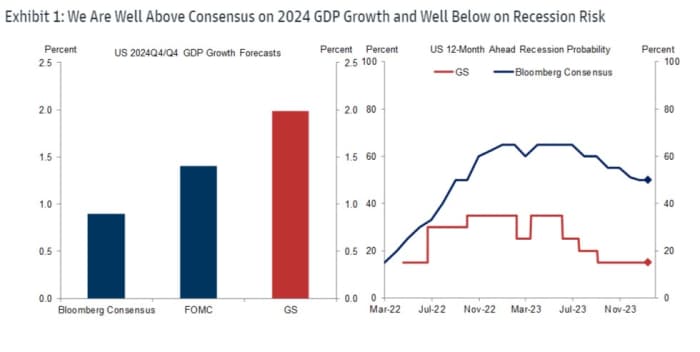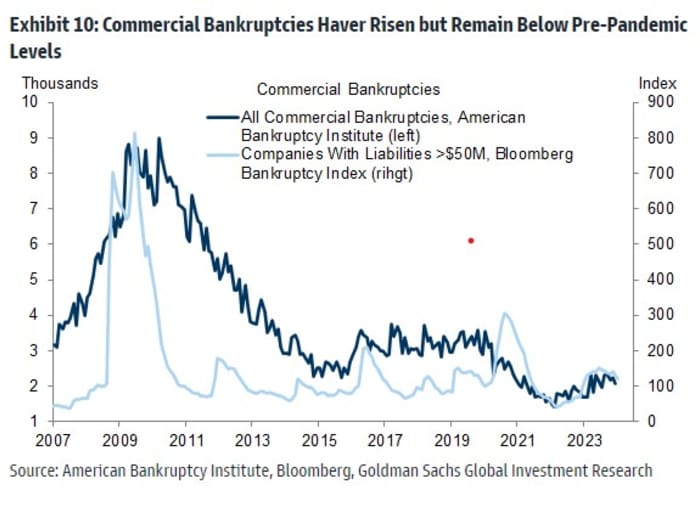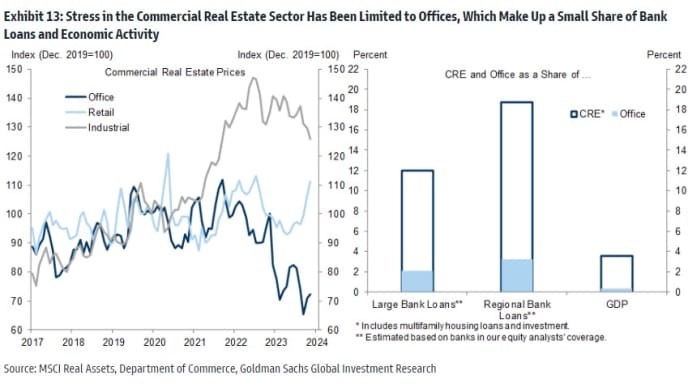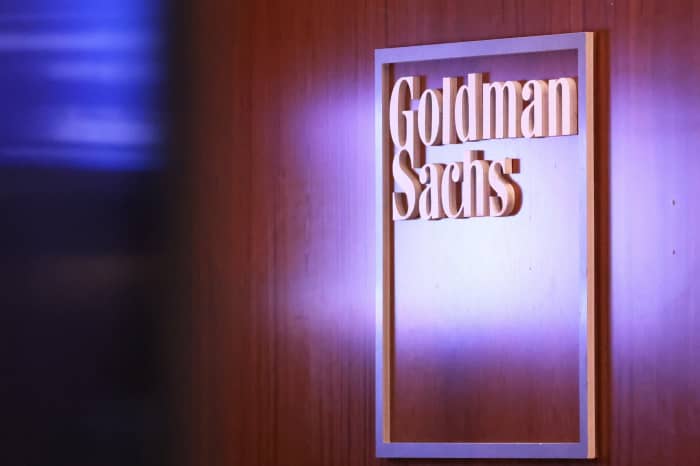Goldman Sachs’ Low Probability of US Recession in the Next 12 Months
January 17, 2024 | by stockcoin.net

Goldman Sachs’ confidence in the U.S. economy surpasses that of its Wall Street counterparts, as the esteemed bank predicts a robust 2% growth in U.S. GDP for the fourth quarter of 2024, in stark contrast to the consensus estimate of a mere 0.9%. Furthermore, Goldman Sachs boldly declares a low probability of a U.S. recession occurring within the next 12 months, citing a less than 20% likelihood as opposed to the prevailing belief of a 50% chance. While other forecasters express concerns about various risks that may threaten the economic landscape in 2024, such as a consumer slowdown, rising consumer delinquency rates, or the impact of higher interest rates, Goldman Sachs counteracts these worries with comprehensive explanations outlining why it believes these risks will have less impact on the U.S. economy than initially feared.
Goldman Sachs’ Confidence in the U.S. Economy
Goldman Sachs, one of the leading financial institutions on Wall Street, has expressed greater confidence in the state of the U.S. economy compared to other analysts. While concerns loom over potential risks and uncertainties, Goldman Sachs remains optimistic about the future growth and stability of the economy. In this article, we will delve into their outlook and predictions, as well as their stance on the likelihood of a U.S. recession.
Goldman Sachs’ Outlook Compared to Other Analysts
When it comes to assessing the U.S. economy, different analysts often hold varying opinions. However, Goldman Sachs stands out due to its more positive outlook. While concerns regarding potential risks exist, the bank maintains a sense of optimism, suggesting that the economy is on a favorable trajectory. This divergence in views between Goldman Sachs and other analysts can be attributed to several factors, including their in-depth research, comprehensive analysis, and proprietary models that enable them to make informed predictions.
Projected Growth in U.S. GDP
Goldman Sachs predicts that the U.S. gross domestic product (GDP) will experience a growth rate of 2% in the fourth quarter of 2024. This forecast is considerably higher than the consensus estimate of 0.9% put forth by other analysts. The projection indicates Goldman Sachs’ confidence in the positive momentum of the U.S. economy. Their prediction takes into account various indicators, such as consumer spending, business investments, and government policies, which collectively shape the overall GDP growth.
Probability of a U.S. Recession
One of the crucial concerns in any economy is the possibility of a recession. Goldman Sachs is notably less apprehensive about this compared to the consensus estimate. While the consensus places the probability of a U.S. recession at around 50% in the next 12 months, Goldman Sachs believes this likelihood is significantly lower, at less than 20%. Their analysis and models factor in multiple variables, including economic indicators, fiscal and monetary policies, and global economic conditions, thus informing their more sanguine perspective on the risk of recession.
Goldman Sachs’ Predictions vs. Consensus Estimates
Goldman Sachs’ predictions for the growth in U.S. GDP for the fourth quarter of 2024 exceed the consensus estimates. While the consensus estimates place the growth at 0.9%, Goldman Sachs is more optimistic, projecting a growth rate of 2%. This disparity between predictions reflects Goldman Sachs’ confidence in the underlying strength and resilience of the U.S. economy. Their analysis takes into account various factors, such as job growth, consumer spending, business investments, and international trade dynamics, which collectively influence the trajectory of GDP growth.
Low Probability of U.S. Recession
Contrasting views on the likelihood of a U.S. recession exist among analysts, with Goldman Sachs taking a more optimistic stance. While some forecasters express concerns and anticipate a recession, Goldman Sachs maintains a lower probability of this outcome. This optimistic perspective is rooted in their comprehensive analysis and their confidence in the economic indicators they monitor. Their models and research suggest that the U.S. economy is well-positioned to withstand potential downturns and that the risks of a recession are relatively low.
Goldman Sachs’ 10 Risks for 2024
Despite their overall positive outlook, Goldman Sachs acknowledges the existence of potential risks that could impact the U.S. economy in 2024. These risks include a consumer slowdown, rising consumer delinquency rates, a deterioration in the labor market, narrow job growth, rising corporate bankruptcies, the impact of higher interest rates on debt maturities, concerns about commercial real estate, and fading fiscal support. While other forecasters express worry about these risks, Goldman Sachs maintains a relatively lesser concern.
Explanations for Low Impact of Risks
Goldman Sachs provides sound reasoning for its belief that the risks they have identified will have a lesser impact on the U.S. economy than anticipated by others. Through their extensive research and analysis, they have identified specific factors that mitigate the potential negative consequences of these risks. By evaluating multiple variables, such as historical data, current economic conditions, and ongoing policy measures, Goldman Sachs is able to outline why they believe the impact of these risks will be limited.
Consumer Slowdown
One of the risks identified by Goldman Sachs is a possible consumer slowdown. This could occur due to various factors, such as decreasing consumer confidence, higher inflation rates, or changes in consumer spending patterns. However, Goldman Sachs argues that the extent of the impact of a consumer slowdown on the U.S. economy will be limited. Their analysis suggests that the overall strength of the economy, coupled with government interventions and supportive policies, will offset the potential negative effects of a consumer slowdown.
Rising Consumer Delinquency Rates
Another risk highlighted by Goldman Sachs is the rising consumer delinquency rates. This refers to the increasing number of individuals or households falling behind on their loan payments or defaulting on debts. While this trend may raise concerns about the stability of the economy, Goldman Sachs maintains a perspective that downplays its overall impact. They argue that while individual cases of delinquency may cause hardship for some, the broader economic indicators mitigate the consequences at the macro level, minimizing the systemic risk to the economy.
Deterioration in the Labor Market
A potential deterioration in the labor market is another risk outlined by Goldman Sachs. This could manifest as a decline in job availability, a rise in unemployment rates, or reduced wage growth. However, Goldman Sachs rebuts concerns about a severe negative impact on the economy. They suggest that structural factors, government policies, and proactive business strategies will help alleviate the potential downturn in the labor market, ensuring that it does not undermine the overall stability and growth of the U.S. economy.
Narrow Job Growth
Narrow job growth, characterized by slow or limited growth in job opportunities, is identified as a risk by Goldman Sachs. This can stem from various factors, such as technological disruptions, shifting industry dynamics, or changing demands for certain skills. However, Goldman Sachs views the potential impact of narrow job growth as relatively minor. They believe that the underlying strength of the U.S. economy, combined with adaptive measures taken by businesses and supportive government policies, will help counterbalance the challenges posed by limited job growth.
Fading Fiscal Support
Goldman Sachs recognizes the fading fiscal support as a potential risk for the U.S. economy. As government stimulus measures and supportive policies gradually diminish, there may be concerns about the sustainability of growth and stability. However, Goldman Sachs contends that the impact of fading fiscal support will be minimal. They argue that the economy has built sufficient resilience and momentum, and businesses and consumers have adapted to the evolving landscape, mitigating the potential negative effects of reduced government intervention.
In conclusion, Goldman Sachs’ confidence in the U.S. economy stands out amidst differing opinions among analysts. They predict higher growth in U.S. GDP compared to consensus estimates, while also projecting a lower probability of a U.S. recession. Although they identify 10 risks for 2024, including a consumer slowdown, rising consumer delinquency rates, and deteriorating labor market conditions, Goldman Sachs provides explanations for why they believe these risks will have limited impact. Their comprehensive analysis and models inform their positive outlook and reveal their optimism about the resilience and strength of the U.S. economy going forward.

RELATED POSTS
View all










